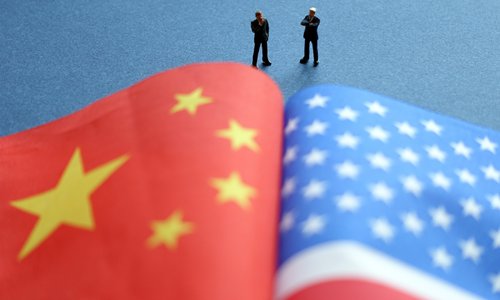HOME >> OPINION
Only sincerity can break trade impasse
Source:Global Times Published: 2019/6/27 22:43:41

Photo: VCG
US President Donald Trump on Thursday boasted of the tariff war's benefits to the US economy, and declared that if there is no progress on a trade deal after his meeting with Chinese President Xi Jinping, he will carry out his "Plan B" - imposing tariffs on the remaining $300 billion worth of Chinese products. But he said the tariffs may be "not at 25 percent, but maybe at 10 percent."
Exerting pressure on the other side before important meetings or negotiations is an old tactic that the US side often adopts. The Chinese side is overly familiar with their modus operandi, and will not fall for it.
The US side has released a stream of messages these past few days, which indicates its anxiety. It wants to pressure China, and meanwhile pump up US stock markets. The White House is proudly taking credit for the recent bullish market, but it is easy to understand that the market will plummet if the meeting between China and the US at the G20 in Japan goes contrary to market expectations.
The US lowered the threat of imposing 25 percent tariffs to 10 percent, which is obviously affected by the opposition that more than 300 representatives of businesses and trade associations in the US displayed toward new tariffs on China during a hearing in Washington, DC. Will the new tariffs add more pressure on China's economy, or on the US economy and politics? The situation is getting more interesting. If the US believes waving its long-held $300 billion tariff card before an important meeting is effective, then such a strategy is way too naïve.
China's attitude toward the two state leaders' meeting is active and constructive. Meanwhile, China will defend its own core interests and will not make unconditional concessions. We hope China and the US can seek a compromise while taking into consideration both sides' core interests. The situation over the past year has proved that one side's overwhelming victory against the other side is unrealistic. Establishing a principle of equality and mutual trust is a must to reach an agreement.
Clearly aware that it can't get what it desires by only applying pressure, the US requested a phone conversation between the two state leaders, during which they agreed to meet at the G20. Unless the US just wants a temporary market boom, it should change its strategy of maximum pressure to one of candid dialogue and seek a real win-win result. The US trade war plot can no longer be sustained. Washington's hype that it is China that most wants a deal is just a way to reassure itself.
China wants a trade deal, but will always reject an unfair deal. It has nothing to do with how much pressure the US applies.
Many small countries in the world resisted firmly when they faced unreasonable demands from the US backed by threats of sanctions, let alone an economic and trade giant like China. After a trade war that has lasted more than a year, if the US still does not understand that tariffs will not intimidate China, it will be a tragedy for the US side.
The G20 Osaka Summit provides an opportunity for China and the US to break the impasse. The two sides have reasons to cherish this opportunity, instead of taking the chance to impose impossible conditions on the other side. They should not waste their time in repeating the past failed attempts. It is obvious that the international community, including the US public, hopes to hear good news from this summit.
Both China and the US have enough room to maneuver if the two leaders' meeting fails to reach a desirable outcome. But the US should not declare that US society is more capable of enduring the trade war than China. Whether there is an agreement or not, China will defend its core interests and will focus on doing its own things well. China is well prepared economically and politically.
Posted in: EDITORIAL